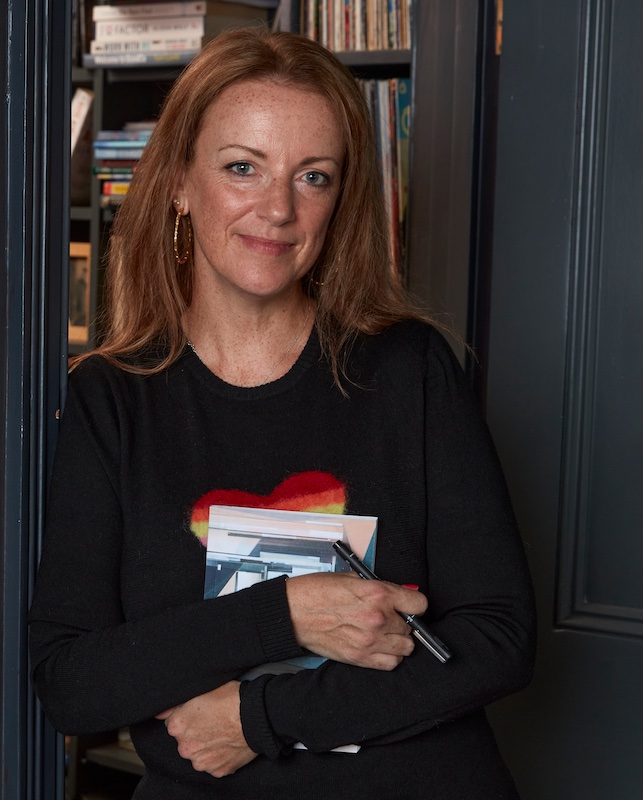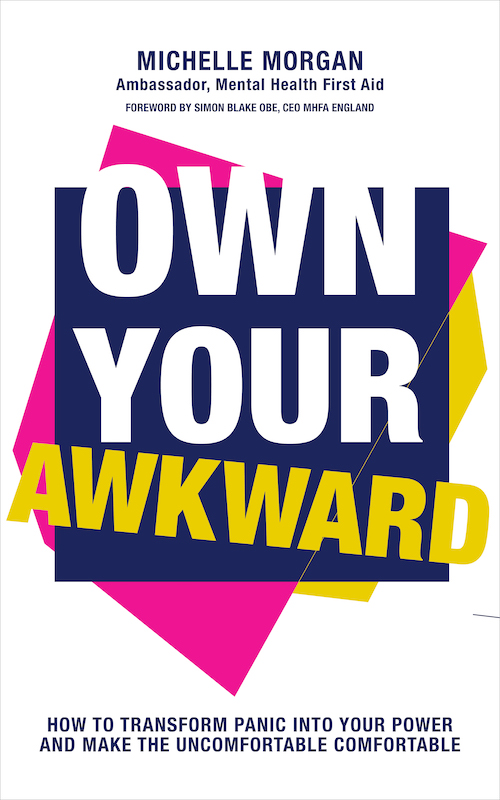 I guess in a work sense I could be described as a serial Social Entrepreneur, having founded 5 purpose-led businesses during my career so far.
I guess in a work sense I could be described as a serial Social Entrepreneur, having founded 5 purpose-led businesses during my career so far.My current business is Pjoys – PJs with purpose, we’re on a mission to use artist-designed pyjamas and the symbolism of ‘The PJ Day’ as the ‘Trojan Horse’ to deliver mental health messages of hope and help to others. I co-founded, and was the CEO of Livity, a youth led creative agency, for its first 16 years and I stayed on as a Non-Executive Director when I stepped out of the day-to-day business after my burnout in 2017. I’m also an Ambassador for Mental Health First Aid (MHFA) England, I have my own mental health training consultancy and recently I’ve become an author – which has been an amazing journey over the last year; I wanted to find a way to help share what I’ve learnt about mental health over the last few years with as many people as possible, and also explore and understand what stops us from having those uncomfortable conversations about mental health, whether we want to offer someone help, or ask for help ourselves, the truth is it often feels awkward, difficult, and easier to avoid than having the conversation. During the writing of my book, I discovered why that is, what we can do about it, and how to have those important and ultimately empowering conversations. Outside of my work, I’m a mum to my 17-year-old daughter and married to Remi Rough, an artist, who’s work I also manage. And oh yes, there’s also my furry son, our dog Teddy – who brings us constant joy!
No! In fact, I failed most of my school exams, I got chucked out of college and it was doing a typing course that got me into the world of work, through necessity rather than any kind of plan and ambition. I really struggled with my mental health and self-esteem in my teenage years. One of my first roles was as a typist on a building site in Essex. Every morning I had to walk across the site to the office, in my steel toe capped boots, hard hat, a very tight skirt and really ‘big hair’– looking back, it must have been quite a picture! There were many, what I call ‘wilderness years’, all of which contributed to rich life lessons, if not the most glamourous of jobs and roles. It was moving to Hong Kong in the late 90’s that helped me get into the creative industries and then set up my own agency when I returned to London. There’s never been a big plan – more, going with a ‘purposeful flow’. For me, when my sense of purpose and passion begins to fade, that’s a good indicator to think about ‘what next’. And that typing course is as valuable today as it was then.
How long have you got? The type of businesses that I’ve been involved in starting and growing have all been what might be described as ground-breaking and often future-thinking, both of which are exactly what drives me, and exactly what can be challenging and exhausting, with many fails and successes along the way. You have to welcome the challenges.
Aside from my daughter and my marriage, I’d say recovering from the burnout, depression and anxiety I experienced in 2017. It was the darkest and most difficult of times, I felt like I couldn’t go on and I couldn’t see any glimmer of a positive future. I had been told that ‘it was awkward’ when I talked about my mental health, which had been so crushing and silencing that I completely stopped talking about it and didn’t get help. It was connecting with someone else’s story, Ruby Wax, as she described her own experience of depression in her book Frazzled, that I felt less alone and suddenly had the words and language to describe how I felt. It’s what got me to the GP, into treatment and, with patience and perseverance, into a place of recovery. I’ve poured everything from that terrible time into my new mission in life, to help people own those awkward moments and have better and braver conversations about mental health.
A commitment to self-development. Failing all of my school exams, being chucked out of college, not going to university when all my friends were there, at the time, made me feel not so great about myself, it shouldn’t have, but this is life. A turning point was when I reengaged with learning, but this time, learning about things I was interested in, and relevant to me, whether it be attending Cranfield School of Management for a business course, working with a leadership coach, having therapy or learning to become a Mindfulness Based Cognitive Therapy Instructor in the very first lockdown, all of these learning experiences have shaped me, improved me and have contributed to topping up my self-esteem, resilience and confidence – as well as improving and adding to my skills.
When I first began talking publicly about my burnout and mental Ill-health, I was amazed how many people would want to tell me how much they connected with my story and experience. It also meant that I was on the receiving end of many individuals disclosing their mental health issues to me. Whilst I was becoming more of an expert on my own mental health, I was nervous to give other people advice and help. So, I Googled ‘mental health training’ and soon found Mental Health First Aid – it looked a bit like the physical first aid course, but for mental health – perfect. I found the 2-day course completely transformational, so much so that as I was in the process of launching Pjoys and wanted to immerse myself in the topic of mental health, I decided to train to become an MHFA instructor – even now, a few years on, it’s a joy to deliver this training, I see the difference it makes. Simon Blake, the CEO of MHFA England asked me to become an Ambassador two years ago and I’m so proud to be able to celebrate the importance and impact MHFA has in the workplace, and beyond. MHFA training is about creating the unshakable belief that we can all talk freely about our mental health and seek support when we need it.
Simon wrote the Foreword to my book, and I think our relationship is a great example of the broader mental health sector, it’s less about competing and duplicating and more embracing the power of ‘we’.
I’ve identified 4 key cornerstones of having courageous conversations; confidence, capability, communication and compassion – the book strengthens all of these areas with frameworks, information, conversation starters and stories shared by other people, as well as myself. I was also curious to better understand why it’s awkward talking about our mental health, and so by talking to a number of professionals I discovered that it’s our natural survival instinct kicking in, and our need for belonging. When you understand why it feels uncomfortable, you can begin to apply perspective and also techniques to help transform and reframe the situation, it’s about turning awkward into an asset.
I’ll always say train some of your people in Mental Health First Aid. However, having MHFAiders will bring less benefit if there isn’t a culture that nurtures trusted spaces to have honest conversations in the workplace. That’s why I wrote the book and have created an accompanying training programme that helps make mental health an easier and everyday conversation, across entire teams and businesses. Yes, it’s critical to have excellent mental health and wellbeing policies, processes and provisions in place, but without authentic leadership and a meaningful sense of psychological safety across the entire business and at the heart of culture, everything else is potentially worthless.
“There’s this thing called ‘therapy’ – it will change your life, start it now.”
Maybe another book! But before that, I’d love to know that lots of people have read Own Your Awkward and taken something useful or comforting from it. Some of the best feedback I’ve had is people telling me that can really hear my voice when they’re reading the book. It’s taken me a very long time to find my voice in the world, so this is especially wonderful to know. We have some super exciting partnerships and PJs launching across the year and we’ll be launching the online training course, based on the book. All of which will help me continue to deliver my mission to help people have more courageous conversations about mental health. As for the future, I’m choosing small joys over the impossible quest for constant happiness, and I’ll let my ‘what next’ in life present itself when it’s ready.
A hugely practical and inspiring self-help guide, Own Your Awkward will help you handle those awkward conversations around mental health. Michelle Morgan blends research and personal experience to help you tackle those topics, whether in the workplace or with family and friends.
Let’s be honest – it can be really awkward talking about our mental health! Whether you’re offering someone support or looking for ways to help yourself, these conversations can feel difficult, embarrassing and complex.
In Own Your Awkward Michelle Morgan, Mental Health First Aid Ambassador, trainer and speaker explores why we feel awkward and shows us how to talk more openly about our mental health – and how we really can embrace our awkward.
Through her own story of burnout, clinical depression and anxiety, combined with the lived experience of others, Michelle explains how you can transform those tricky moments into your power using four key cornerstones – confidence, capability, communication and compassion, to help reframe your story. You’ll learn how to start those all-important conversations, with clear steps and practical advice.
It’s time to get comfortable with feeling uncomfortable, love your awkward and have better and braver conversations about mental health.

